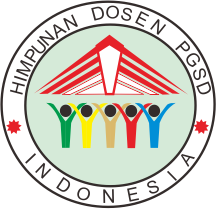MENGEMBANGKAN KOMPETENSI PEDAGOGIK GURU PAI SD/MI DENGAN MODEL PEMBELAJARAN KOOPERATIF
DOI:
https://doi.org/10.30595/dinamika.v6i2.913Keywords:
Pedagogical Competence, Cooperative Learning Model, Islamic Education in SD/MIAbstract
Teacher’s pedagogical competence can be developed and the quality can be increased through the application of cooperative learning model. By using this model, a teacher could use many interesting methods to improve the students’ interest, motivation and achievement. By this strategy, the learning interaction will be more “many-direction” and learning source diversification. The cooperative learning strategy was directed to develop the students’ cognitive ability as well as their interpersonal competence. Cooperative learning strategy is one of the alternatives can be used in Islamic Education for effective and efficient learning to achieve the determined learning goals. Cooperative learning strategy is psychologically suitable with the students’ social development in their age of SD/MI and suitable with their characteristic that is to enjoy working in groups. Cooperative learning strategy is also a reflection of the Indonesian character namely mutual cooperation. Therefore, the learning should be suitable with the society condition and the mutual cooperation should be the principle coloring this learning practice for the students. In the application of cooperative learning, it needs the willingness and the ability as well as the teachers’ creativity to manage class, so the teacher will be more active especially in making well-done lesson plans, class management in action, and make assignment for students with groups.References
Desmita. 2006.Psikologi Perkembangan. Bandung: Rosdakarya.
Evertson, M. Carolyn dan Edmund T. Emmer. 2011.Manajemen Kelas untuk Guru Sekolah Dasar. Jakarta: Kencana.
Huda, Miftahul. 2011.Cooperatif Learning Metode, Teknik, Struktur, dan Model Penerapan. Yogyakarta: Pustaka Pelajar.
Ibrahim, 2000. Pembelajaran Kooperatif, Surabaya: Unesa Press.
Ilyasin, Muhammad. 2011.Manajemen Pengembangan Profesionalisme Guru. Yogyakarta:Insyira.
Isjoni. 2009. Pembelajaran Kooperatif Meningkatkan Kecerdasan komunikasi antar Peserta Didik. Yogyakarta: Pustaka Pelajar.
_____. 2009.Cooperative Learning, Efektifitas Pembelajaran Kelompok. Bandung: Alfabeta.
Ismail. 2008.Strategi Pembelajaran Agama Islam Berbasis PAIKEM. Semarang: RaSAIL,
Joice, Bruce. 1996.Models of Teaching. London: Allyn and Bacon.
L, Zulkifli. 2005. Psikologi Perkembangan. Bandung:Rosdakarya.
Lie , Anita, 2008.Cooperative Learning Mempraktekkan Cooperative Learning di Ruang-ruang Kelas, Jakarta: Grasindo,
Mulyasa, E. 2009.Menjadi Guru Profesional. Bandung: Rosdakarya.
Nasution. Didaktik Asas-Asas Mengajar. 1995.Jakarta:Bumi Aksara.
Nurdin, Syafrudin. 2002.Guru Profesional dan Implementasi Kurikulum. Jakarta: Intermasa.
Prabowo, Sugeng Listyo. 2010.Perencanaan Pembelajaran. Malang: UIN Maliki Press.
Silberman, Mel. 2010.101 Cara Pelatihan dan Pembelajaran Aktif. Jakarta: Indeks.
Slavin, Robert E. 2008.Cooperative Learning. Bandung: Nusa Media
Solihatin, Etin dan Raharjo. 2008.Cooperatif Learning Analisis Model Pembelajaran IPS. Jakarta:Bumi Aksara.
Suyono dan Hariyanto. 2011.Belajar dan Pembelajaran. Bandung: Rosdakarya.
Suprijono, Agus. 2009.Cooperatif Learning: teori dan Aplikasi PAKEM. Yogyakarta: Pustaka Belajar.
Yamin M dan Maisah. 2010.Standarisasi Kinerja Guru. Jakarta:Gaung Persada Press
Downloads
How to Cite
Issue
Section
License
Authors who publish with this journal agree to the following terms:
Authors retain copyright and grant the journal right of first publication with the work simultaneously licensed under a Creative Commons Attribution License that allows others to share the work with an acknowledgement of the work's authorship and initial publication in this journal.
Authors are able to enter into separate, additional contractual arrangements for the non-exclusive distribution of the journal's published version of the work (e.g., post it to an institutional repository or publish it in a book), with an acknowledgement of its initial publication in this journal.
Authors are permitted and encouraged to post their work online (e.g., in institutional repositories or on their website) prior to and during the submission process, as it can lead to productive exchanges, as well as earlier and greater citation of published work (See The Effect of Open Access).

Dinamika Jurnal Ilmiah Pendidikan Dasar is licensed under a Creative Commons Attribution 4.0 International License.













